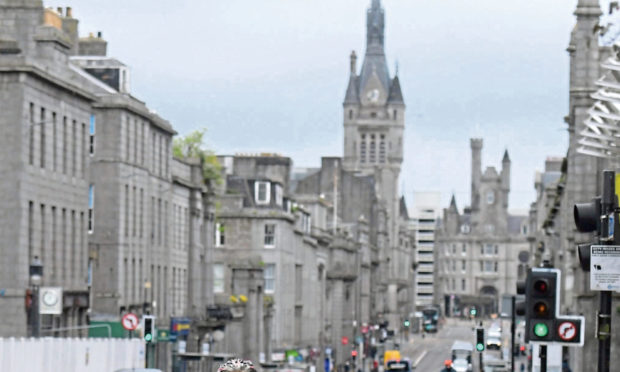New study findings show the size of the working population across Aberdeen city and shire has shrunk by 9% – meaning 21,500 fewer jobs – over the past five years.
Using data from the Fraser of Allander Institute, Just Transition Commission, Office for National Statistics and Scottish Government, the Scottish Council for Development and Industry (SCDI) has highlighted a steady decline in north-east employment during 2016, in the aftermath of a severe oil and gas downturn.
This was followed by three years of stability and then a sharp drop after April 2020 as the Covid-19 pandemic took its toll on jobs.
Other parts of Scotland have been just as badly hit by the coronavirus in terms of reduced employment, but they did not suffer workforce contraction in 2016. In fact, some areas enjoyed employment growth that year.
According to SCDI’s latest State of the Nation report, 19% of Scottish workers are currently on furlough – representing more than 600,000 jobs.
The sectors with the highest proportion of workers on furlough remain accommodation and food services (63%) and arts, entertainment and recreation (60%).
North-east employment down 5.5% year-on-year
Levels of payroll employment in Aberdeen and Aberdeenshire are 5.5% lower than a year ago, SCDI said, adding the figures underlined the need for a “just transition” to a net-zero Scotland to spread the costs and benefits of decarbonisation.
This is especially important for “communities which have historically been more reliant on jobs in high-emitting industries”, the business group said.
SCDI policy manager David Kelly said: “The north-east’s economy has been hit hard by the pandemic.
“Two out of every three workers in accommodation and food services, and arts, entertainment and recreation remain furloughed.
“Many will be concerned about the future and fear for their jobs as lockdown eases. Only 53% of Scottish businesses say they’re sure they’ll survive the next three months, leaving a large proportion less confident about the future.
“Unfortunately, this is part of a recent trend in the north-east. During the past five years over 21,500 jobs have been lost, many in the oil and gas industry, and nearly half during the pandemic.”
‘Winners and losers’
Mr Kelly added: “The social and economic disruption of our progress towards a net-zero economy is well under way – and it’s already creating winners and losers.
“This data underlines the urgent need for investment to commence in a just transition to net-zero which supports workers to reskill and upskill for new jobs in emerging green sectors like renewables, industrial biotech and the circular economy. We need to act now to mitigate negative impacts and maximise positive economic benefits.
“SCDI’s Manifesto for Clean Growth, published last December, sets out how Scotland can be a world leader in clean growth which delivers for our people, our economy and our planet.
“The recently agreed North Sea Transition Deal is a positive step forward for this agenda and for the north-east’s future, bringing government, industry, innovators and workers together to decarbonise offshore energy and protect jobs.”
Mixed picture
Aberdeen and Grampian Chamber of Commerce chief executive Russell Borthwick highlighted a “fairly mixed and challenging picture for business” in the region.
Mr Borthwick added: “Local firms have been telling us what they need to help the regional economy bounce back from the impact of the past year.
“This includes tax policies which encourage investment and entrepreneurship, meaningful action plans to secure the survival and rebirth of our town and city centres, and strengthening our physical and digital connectivity to safeguard and develop our economic resilience.
“The chamber is trying to delve deeper into these issues so we can ensure the voices of north-east businesses are heard loud and clear in the corridors of power at Holyrood and Westminster.
“The Aberdeen and Aberdeenshire Business in 2021 and Beyond survey seeks to provide a forum for all organisations in the north-east to express their priorities and challenges in the months and years ahead, and we encourage everyone to take part.
“The fact that employment figures are worse in the north-east than in other parts of the country is deeply worrying.
“However the recent announcement of the North Sea Transition deal and Energy Transition Zone confirms that Aberdeen will be at the heart of delivering the new energy technologies that will enable our move to net-zero, retaining and creating thousands of high value jobs in this city region for decades to come.”
Jake Molloy, regional organiser for the RMT union, said SCDI’s research underlined the need for “greater ambition from government” to protect energy industry supply chain jobs.
“We’ve had two significant political reports in the last couple of weeks – the Scottish Government’s Just Transition Commission report and the UK Government’s North Sea transition deal, Mr Molloy said, adding: “The stark figures from the Scottish Council for Development and Industry illustrate why both reports must now deliver, as we desperately need actions more than words.
“The Just Transition Commission (JTC) talked about being near the ‘now-or-never’ point for wind generation projects, saying that quick action would be needed to carve out a share of manufacturing content.
“The JTC went on to say that, as a last resort, ‘policy makers must also be prepared to step in to provide support to people and places should we see industrial employment decline here in Scotland’.
“Employment decline in the north-east demonstrates we are absolutely at the now-or-never point and we need the policy-makers to step in.”

